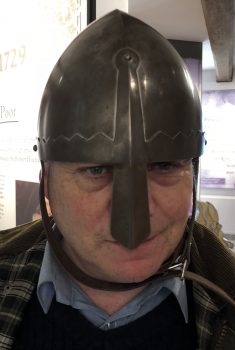We are developing the social individualist meta-context for the future. From the very serious to the extremely frivolous... lets see what is on the mind of the Samizdata people.
Samizdata, derived from Samizdat /n. - a system of clandestine publication of banned literature in the USSR [Russ.,= self-publishing house]
|
Grim news from South Africa. Just in case anyone thought that the departure of President Zuma, a corrupt man who has stripped his country (South Africa faces severe water shortages brought on by neglect of infrastructure) might lead to better things will be disappointed. The new regime has signed off on a land-grab policy of confiscating white-owned land without compensation. (About 70 per cent of South African farmland is owned by whites.) The claim made is that any white person who owns land in the country must, by definition, have stolen it. (The idea that such ownership might have come into being without theft just does not cross certain persons’ minds. That fact is simply undiscussible.)
As we have found in the seizure/collectivisation of farms in the former Soviet Union, in China, and in Zimbabwe more recently, such moves herald mass poverty and violence. South Africa has ironically seen an influx of poor Zimbabweans since the vile Mugabe regime started to attack white farmers and seize land; the country has suffered a catastrophic decline in its farmland output, which may never recover. South Africa seems keen to follow suit; it has a range of largely self-inflicted woes: the current government is deeply corrupt. The country needs inward investment – seizing white-owned property hardly encourages any investor, of any racial background. As a matter of simple common sense, taking land by brute force, without compensation, from owners and giving it to those who are political cronies and hangers-on will inevitably reduce output and wealth, not the other way round.
The unfolding of South Africa’s history is a tragedy, and it is easy to see why there is an element of “score-settling” at work here. Apartheid, let it not be forgotten, was introduced in the late 1940s at the behest to some degree of the white trade union movement, keen to bolster its bargaining power. Even if you were a private entrepreneur who wanted to hire non-whites for certain jobs, for example, you couldn’t. (Minimum wage laws operated in ways that hurt, not helped, non-whites.) The system was as absurd and vile as the Jim Crow laws of the US, or other examples of serfdom and oppression down the ages. It had to go; for anyone who supports a free market economy, apartheid and its cousins are absurd as well as wrong.
But the solution of seizing white-owned land, regardless of the honesty or provenance of it, and giving it to people via a political carve-up, turns the injustices inherited from the old regime on their head, creating a new form of racism. Two wrongs do not make a right. And further, one suspects that the land seizures are an attempt to deflect attention from the failings of the existing regime. Compare and contrast how, for example, the “Asian tigers” threw off their old colonial masters and focused on getting seriously rich, not least by respecting property rights. And wherever one looks, there does seem a pretty tight correlation between respect for property rights – indeed their very existence – with prosperity and happiness more broadly. Hernando de Soto has made something of a career pushing the point that the world needs more property rights, spread among more people. (Check out this recent lecture by Niall Ferguson on the same sort of issue.) As an aside, it also seems to be a pretty solid marker of respect for property rights to have a large and growing middle class. I suspect that one of the underlying problems in South Africa is that among the non-white population, persons who can be so described aren’t a big portion of the total.
Lest anyone pounces on the notion that what has happened proves that certain racial groups are incapable of building a civilized political order, bear in mind that here in the UK, the oh-so-white Caucasian leadership of Her Majesty’s Opposition, Jeremy Corbyn, and his colleagues, want to do to the owners of privately-owned industries such as electricity, gas, and the rest what the new leadership in South Africa wants to do to white farmers. The defence of settled property rights remains a vital cause for anyone interested not just in prosperity, but liberty. As of this week, that cause took a turn for the worse in South Africa.
What’s interesting about this Florida school shooting is that events are revealing themselves in such a way that not even the most statist of gun controlling media types are able to spin the narrative to their ends. The old adage that “when seconds count, the police are only minutes away”… well, that’s a pithy line, and it hits home. It also assumes that the police are minutes away. Not in this case. In fact, the police were seconds away, yet they didn’t intervene. In Parkland, it wasn’t that the state couldn’t protect you – no, it could have. Actually, the state wouldn’t protect you. You were on your own.
What message should the ordinary citizen take away from this? That it is clear and painfully obvious they need to protect themselves.
Best justification for the 2nd Amendment in my lifetime at least.
– James Waterton
A senior English police officer has called for children of extremists to be taken away from them.
Terrorists should have their children taken off them in the same way that paedophiles do, Britain’s outgoing top anti-terror policeman has said.
Assistant commissioner at the Metropolitan police, Mark Rawley, said that children of terrorists were exposed to environments equally as “wicked” as victims of paedophiles were and so should be afforded the same protection.
In his valedictory speech, he told the Policy Exchange: “If you know parents are interested in sex with children, or if you know parents believe that people of their faith or their belief, should hate everybody else and grow up to kill people, for me those things are equally wicked environments to expose children to.”
Meanwhile, far away in Argentina, the Grim Reaper has finally called for one of the old ‘Dirty War’ Generals, Luciano Benjamín Menéndez (cousin of the clown who was ‘Gauleiter’ of the Falklands in 1982 until some Paras, Guards, Marines and Gurkhas et. al. turned up).
Menéndez, also known as “The Hyena,” was the military commander of ten Argentine provinces from 1975 to 1979.
Some 30,000 people are estimated to have been killed by the military in its infamous Dirty War against dissidents.
Menéndez was also convicted for abducting children from detained anti-government activists and giving them up for adoption.
The children were often adopted by families of military officials, who strived to give them a non-communist upbringing.
The Montoneros were a murderous bunch for sure. But why does a senior English police officer think it is appropriate to imitate a South American Junta?
Like Matt Walsh, I remain baffled at why the slaughter of concert-goers in Las Vegas a few months ago, and the almost total lack of evidence or data on the killer’s motives and actions, haven’t caused much in the way of a media/political firestorm, contrasting with events of recent days:
If you recall, dozens upon dozens of people were gunned down in Las Vegas on October 1. There were 58 fatalities in total. Another 422 injuries. That’s 480 casualties — 480 casualties — and I’m not even counting the hundreds more injured by trampling or shrapnel. It was the worst mass shooting in modern American history by a mile. It had more casualties than Orlando, Virginia Tech, Sandy Hook, and Parkland combined — times two. And it was carried out in the middle of a major American city.
Yet that terrible massacre seemed to fade from the headlines rapidly and inexplicably. The country had almost entirely moved on by the beginning of the following week. It seemed to me that we had forgotten about it within three or four days, but I’ll say a week just to be safe. The media is so obsessed with Parkland that several of its survivors are now practically household names. Does anyone remember the names of a single one of the Las Vegas survivors? Did any of them do media tours? Did CNN hold a “town hall” about Las Vegas? Was there an extensive conversation about potential law enforcement failures in Las Vegas, as there has been about their failures in Florida? We’ve all had quite a bit to say about the police officer who waited outside while kids were gunned down, but what about the police officers and armed security who made it to the shooter’s hotel room while he was still raining shots down on the crowd, but stood outside the door for an hour before entering?
From my vantage point, it seems that fairly early on, the media seemed to give up a hunt for explanations and for holding various people to account. Consider this point: Vegas hotels are famously packed with CCTV to foil thieves and crooks of various descriptions. And yet a man was able to get a large cache of weapons into a room and do what he did.
The trouble with even writing about this topic now is that I feel that I sound like a conspiracy nut, which I am emphatically not.
All very odd.
I remember the moment when I had to get plugged into email, some time in the mid-to-late 1990s. I was on the phone and he asked me: What’s your email? I had no answer. He said: oh. It was the way he said it. I knew I had to get an email address sorted immediately.
With social media it was much more gradual. For about a decade, the social media were sold to me as mechanisms for me to influence the world. But during that same decade my desire to influence the world slackened, and a rule of mine is: do not unleash solutions upon circumstances which are not a problem. So, no social media. But as time passed, I realised that I wasn’t just not changing the world, I was ceasing to understand it. The more I read things, the more I heard echoes of social media conversations and dramas of which I had no direct knowledge, which had been going on for a fortnight or more before I even heard rather confusing reports about whatever it was. I was losing touch. (In particular I failed to understand the last two US Presidential elections.)
So it was that, finally, years after most others of my acquaintance, I have now plugged myself into Facebook and into Twitter.
Not that this was easy, mind you. They kept asking me to type in bits of code which I had just asked them to send to me and which they claimed that they had just sent to me but which they never did send to me. But, with help, I eventually got it all sorted. Having waited a decade, the further wait wasn’t a problem.
First impression: I greatly prefer Twitter to Facebook. Indeed “greatly” doesn’t communicate the gulf. Twitter is, for me, now, very useful. Facebook is, for me, not useful, at all, not yet and maybe not ever.
The basic reason for this disparity of usefulness is that whereas I think I am pretty sure that I understand what Twitter means by the word “follower”, I have no clear idea at all of what Facebook means by the word “friend”.
As soon as I got connected to Facebook, a hoard of total strangers sent me emails (or Facebook sent me emails about them) referring to “notifications”, which said something along the lines of: let’s be friends. Who were these people? They didn’t seem like “friends”. More like email spammers. And what would it mean for me to be a “friend” of them? If I shared a home with a Facebook veteran all this would no doubt have been explained to me in about half a minute. But, I do not.
Some of the names involved in these Facebook “notifications” I recognised. These were the names of actual friends. I now have three Facebook “friends” who are also real life friends. But frankly, I am learning a lot less about these Facebook-and-real-life friends than I thought I would. I do, after all, possess and make use of: a telephone. And given how little I have learned about these genuine friends from their Facebook postings, I am not inclined to venture further into the great, for me, confusion that is Facebook.
It is always pleasing to see one’s immediate personal reactions seeming to be echoed by others, and I am pleased to note that Facebook is being criticised by others who know much more about it than I do. In particular, it is being accused of deranging rather than enhancing people’s social lives, crucially their friendships, and even, to some extent, driving them a bit mad. Perhaps this is just the usual moaning whenever you get a new technique of communication springing upon the world, but I’d be interested to hear what others say about these sorts of complaints.
Twitter, on the other hand, is a new friend.
“Follower” is a concept that made and makes, to me, immediate sense. No doubt the way that Twitter defines “follower” has ramifications and subtleties of which I am unaware, but the basic idea coincides with reality in a way that Facebook’s notion of “friend”, to me, absolutely does not.
My arrival on Twitter coincided almost exactly with the explosion into something resembling mass celebrity of Jordan Peterson, author of the current best seller 12 Rules For Life. This is a man whom I had already noticed, but whom a whole new slice of humanity is now noticing. And I too am now “following” Jordan Peterson.
But there is no suggestion, from Twitter or from anyone else, that Jordan Peterson is “following” me, and certainly not that he and I are in any sense “friends”. To Jordan Peterson, I am but one tiny blip in a cacophony of new-found celebrity. The concept of me being Jordan Peterson’s “follower”, in other words, precisely describes what is going on and, equally importantly, what is not going on. I am following him. He has no idea of my existence.
Twitter, in other words, makes sense to me because it separates two utterly distinct concepts: me paying attention to you, and you paying attention to me. Twitter also makes sense because attention is just that and only that, attention. It is the lowest form of human relationship, and anyone can start doing it, to anyone they learn about, whenever they please.
There are many more things to be said about Twitter and Facebook, and perhaps commenters on this will say some of these things. (I’m thinking of such matters as the ongoing debate about how and how much Twitter and Facebook are politically biased, and how much that matters.) But for now, instead of speculating about things that others know a lot more about than I do, I will instead turn my attention to concocting further Samizdata postings concerning the things which Twitter has told me about. And which Facebook has not.
One final point. Some of my favourite Tweets have come to me courtesy of this excellent man. No pressure was put upon me to say that, but say it I do. This elephant doing some tidying up, which this man retweeted a few days ago, is particularly wonderful. Jordan Peterson would surely approve.
The Sage of Kettering and I have been on another trip, not to some distant, warm, European setting, but a distinctly chilly Suffolk on a bright early Spring day. Here is my account of our trip to an oft-overlooked corner of England and a dip into the past, focusing on the damage done by the iconoclasts. I am indebted beyond measure to the wonderful Suffolk churches site for inspiration on what to see, and links to pictures.
The first stop was a quick look at a proper windmill, unfortunately under repair, the Post Mill at Saxtead. So much more attractive than the hideous electric-powered windmills that clutter the landscape, sucking up subsidies and slowing down the wind.

Next stop, the focus of our trip, Framlingham Castle, a series of towers with no inner keep, but it does contain an old Poorhouse. Noted as the place where Mary Tudor was when she was proclaimed Queen after the tumult of Edward VI’s death, and she then went on to make her mark with an unwise marriage and her trademark of barbecuing Bishops.

The walls of the castle are impressively high, with an excellent ditch.


Around the towers, there are Tudor chimneys, allowing some local heating.

The castle does not have a keep inside it, it is just a wall with a series of towers. The space inside was used to build a poorhouse.

And in the Poorhouse is a local museum, with a fine collection of curious, including this tribute to General Pershing and his Crusaders.

The Sage decided to try out the headgear, it might be useful with canvassing with local elections coming up.

→ Continue reading: A Suffolk sortie
The old argument about the science of socialism was that it would be more efficient than capitalism and markets. Eliminate all that waste of competition and plan what is to be produced, by whom, where, and we’ll all have more stuff. We’ll be richer in short.
Then we went and tested the contention to destruction and 1989 showed that it was incorrect.
Oh well, not the first nor the last scientific or political proposition shown to be wrong. What’s much more interesting is that the justification for the same policies has changed in this modern age. For all too many people still insist we should be doing those same things, they just trot out different reasons as to why we should. Some that it would be fairer that way, others even going so far as to insist that we shouldn’t have economic growth therefore planning and socialism.
– Tim Worstall
There are really only two types of people: those who want to win in competition, and those who would prefer to shut competition down. The former are the strivers and entrepreneurs; the latter the monopolists and cronies. Philosophically, which are you?
– Arthur Brooks, for context follow the link.
“Moreover, an assault-weapon ban (along with a ban on high-capacity magazines) would gut the concept of an armed citizenry as a final, emergency bulwark against tyranny. No credible person doubts that the combination of a reliable semiautomatic rifle and a large-capacity magazine is far more potent than a revolver, bolt-action rifle, or pump-action shotgun. A free citizen armed with an assault rifle is more formidable than a free citizen armed only with a pistol. A population armed with assault rifles is more formidable than a population armed with less lethal weapons. The argument is not that a collection of random citizens should be able to go head-to-head with the Third Cavalry Regiment. That’s absurd. Nor is the argument that citizens should possess weapons “in common use” in the military. Rather, for the Second Amendment to remain a meaningful check on state power, citizens must be able to possess the kinds and categories of weapons that can at least deter state overreach, that would make true authoritarianism too costly to attempt.”
– David French, at National Review.
Yesterday the Labour leader posted a video to his social media accounts. Dogged for days by accusations he was complicit in passing information in multiple meetings to the Cold War Czechoslovak agent Jan Sarkocy, and having dodged questions on the topic by the press, Corbyn (or Agent Cob as the Statni Bezoecnost called him) decided he would not answer the questions but attack the press that were asking them.
– Matt Kilcoyne
It’s only when you read Leviticus that you realise just how into food, drink, clothes, haircuts and beards God is. He comes across as some kind of allegedly divine, yet utterly materialistic hipster.
– ‘Deschain’ commenting over on the Guardian
The good folks at Lawyers for Britain (all donations appreciated) have cut to the chase with Martin Howe QC’s assessment of the situation as it appears to him.
The European Union’s proposals for the UK’s transition period make grim reading. They are the sort of terms which might be imposed by a victorious power in war on a defeated enemy. They are not terms which any self-respecting independent and sovereign country could possibly agree to, even for an allegedly limited period.
Apparently, we must agree to implement every new EU law while having no say or vote; and we shall not be allowed to conclude trade agreements, even to roll over existing agreements which the EU has with other countries so that they continue to apply to us, without the EU’s permission. We must abide by the rulings of a foreign court on which there will no longer be any British representation.
Apparently, an outrageous and demeaning proposal by the Commission that the UK should be subject to extra-judicial sanctions under which the EU could suspend market access rights is now to be “re-worded”. But that would still leave the UK extremely vulnerable to damaging new rules being imposed on us during the transition period by processed in which we would have no vote and no voice. As reported in the Telegraph last week, the EU has plans to use these powers in order to launch regulatory “raids” on financial institutions on British territory and to make rules which will damage the competitiveness of the UK’s financial services industry
Do not think that this is just a lamentation, there is a perfectly sensible alternative.
What is the alternative? One alternative if the EU persist in offering these unacceptable terms is to walk away from a deal with the EU altogether. That is possible; but there is another way. That is to walk away from the transition arrangement, but still to pursue a longer term trade agreement with the EU.
The post goes on to make a lot of valid points about a way forward, and has an excellent analysis. (Although he is wrong about there being no orange production in the UK, I have just finished a pot of marmalade made commercially from English-grown oranges, albeit on a microscopic scale).
But let it sink it, what we are facing is Finlandisation, a modern-day ‘Treaty of Versailles’ with us as the Central Powers, when it should be a re-run of 1776 and its aftermath.
|
Who Are We? The Samizdata people are a bunch of sinister and heavily armed globalist illuminati who seek to infect the entire world with the values of personal liberty and several property. Amongst our many crimes is a sense of humour and the intermittent use of British spelling.
We are also a varied group made up of social individualists, classical liberals, whigs, libertarians, extropians, futurists, ‘Porcupines’, Karl Popper fetishists, recovering neo-conservatives, crazed Ayn Rand worshipers, over-caffeinated Virginia Postrel devotees, witty Frédéric Bastiat wannabes, cypherpunks, minarchists, kritarchists and wild-eyed anarcho-capitalists from Britain, North America, Australia and Europe.
|











